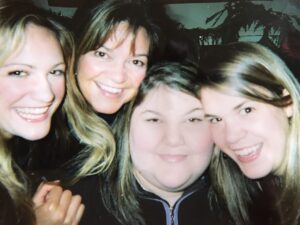
Inspiration from her sister drew this nurse to medicine
Working in medicine can be stressful and comes with long days, challenging circumstances and (as we’ve all experienced the past three years) curveballs like a global pandemic.
When things are tough, where do medical professionals find inspiration and motivation?
April 10 is National Siblings Day, a day when many people celebrate their siblings and the bond they share. Growing up with loved ones who have complex, chronic or terminal medical conditions is the “why” for many who enter the field of medicine.
We talked to a pediatric intensive care unit (PICU) nurse whose relationship with her sister inspired her to become a nurse, and whose memory is the motivation she needs to be her best for her patients every day.
Melissa Albert, RN, has worked as a PICU nurse at Mary Bridge Children’s Hospital for more than eight years. She previously worked for an international nonprofit organization doing administrative work. After some organizational restructuring, Albert’s role was eliminated — but as she puts it, it was a blessing in disguise because it opened the door for her to go to nursing school.
A sisterhood
Albert lost her older sister Kandace, who was in her early 20s, to complications of a benign brain tumor.
“She was two years older than me,” says Albert. “She had a specific role in our family, and as my sister … and then she was gone. I couldn’t figure myself out and I wasn’t passionate about my career path, but I knew that I wanted to make a difference for people.”
That desire came not only from witnessing her sister’s bravery and courage throughout her surgeries, hospital stays and eventual decline; it also came from the doctors and nurses who cared for her sister — and her family.
Albert watched her older sister fight, and ultimately die from, complications of the tumor. Soon after, as Albert was processing the trauma that comes from losing a core family member, she decided to change career paths and become a nurse.
“I saw everything that the nurses did for my sister, and especially the care they provided to my mom during that really, really difficult time. I decided I wanted to do that for another family who was going through what we were going through.”
After she graduated with her nursing degree, Albert knew that working in an adult ICU would be too painful, too close to home.
“That’s where my sister passed and I knew I couldn’t do it,” she recalls.
She wanted to help really sick people and she had a passion for kids, so Albert became a pediatric nurse — and was one of the first nurse residents on the PICU floor at Mary Bridge Children’s.

From left: Melissa with her mom Cindy, older sister Kandace and younger sister Ashleigh, shortly after Kandace’s brain surgery.
Compassionate understanding
“Patients and families in the PICU are living some of the worst days of their lives,” Albert says. “I know that place of pain deeply and personally, and it helps me know how to care for my patients and support their families.”
When the days are tough — as many in the PICU are — Albert says she finds peace knowing that even when the outcome is not what families hope for, she can still provide exceptional care and comfort for these families during a vulnerable time.
“Every time I have a challenging case, I know it’s worth it,” she says. “Even when it’s difficult to cope with and if things don’t end the way we want them to, I must remember that there were lots of ways that I as a nurse made a difference with the care that I gave. I know personally how much of an impact care extended to families makes.”
Albert also knows that nurses in the PICU often need to be that extra family member — the one to just be there with the patient when their loved ones need respite or when their support network is exhausted.
“I try to figure out how to help the family when they’re not able to be there for their child,” she says. “I want them to know that I love their child in those vulnerable moments and that I see their child as a child who is loved.”
In her sister’s memory
Albert remembers how her sister’s care team consistently anticipated her family’s needs before they knew they needed anything. Today, those memories drive her to do the same for the patients and families she cares for.
Another memory she holds close — and encourages her patients to practice — is to make their hospital room their own space.
“One of the best things I see families doing, and that I did a lot of, is making that space full of love and full of your family,” Albert says. “Make it your own with the music you like, pictures that bring you joy, special blankets or games your family likes — anything that will bring comfort and allow you to spend more time with that sibling is so important.”
Thanks to generous community donors, Mary Bridge Children’s supports the whole family and offers programs through its social work, bereavement programs, child life services and therapy services departments, to support siblings of kids going through various treatments.